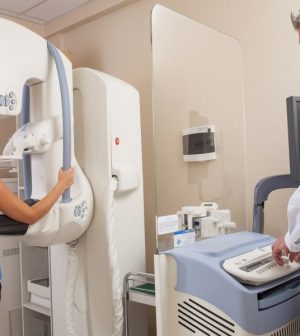- Could Your Grocery Store Meat Be Causing Recurring UTIs?
- Are You Making This Expensive Thermostat Error This Winter?
- Recognizing the Signs of Hypothyroidism
- 10 Strategies to Overcome Insomnia
- Could Artificial Sweeteners Be Aging the Brain Faster?
- Techniques for Soothing Your Nervous System
- Does the Water in Your House Smell Funny? Here’s Why
- Can a Daily Dose of Apple Cider Vinegar Actually Aid Weight Loss?
- 6 Health Beverages That Can Actually Spike Your Blood Sugar
- Treatment Options for Social Anxiety Disorder
Surgery May Boost Outcomes in Common Form of Advanced Breast Cancer

A new study may help resolve a longstanding debate around the impact of surgery for a common form of advanced breast cancer.
The study found that mastectomy may indeed boost the chances of survival for women with stage 4 (advanced) HER2-positive breast cancer.
Twenty to 30% of all newly diagnosed stage 4 breast cancer cases are HER2-positive. This type of tumor has cells that test positive for a protein called human epidermal growth factor receptor 2, which promotes the growth of cancer cells.
Many patients with this type of breast cancer receive “systemic” therapies such as chemotherapy, targeted drug therapies such as trastuzumab (Herceptin), or hormonal therapy.
Mastectomy is sometimes offered to these patients, but it’s long been unclear whether it actually improves a patient’s odds for survival.
But the new study “suggests that in addition to standard HER2-targeted medications and other adjuvant therapy, if a woman has stage 4 HER2-positive breast cancer, surgery to remove the primary breast tumor should be considered,” study senior author Dr. Sharon Lum said in an American Association for Cancer Research (AACR) news release. She’s medical director of the Breast Health Center at Loma Linda University Health in California.
The findings were to be presented Tuesday at the annual meeting of the AACR, in Atlanta. It should be noted that findings presented at medical meetings are typically considered preliminary until published in a peer-reviewed journal.
The new study included more than 3,200 U.S. women with stage 4 HER2-positive breast cancer. Of those, nearly 90% received chemotherapy or targeted drug therapies, nearly 38% had received hormonal therapy, 35% had received surgery, and nearly 32% had received radiation.
Surgery was associated with a 44% increased chance of survival, assuming that most patients were also treated with systemic therapies, the study found.
Still, further research is needed to confirm that surgery can increase the chances of survival in patients with advanced HER2-positive breast cancer, the study authors stressed.
And other factors — including financial ones — came into play as well. The researchers found that patients with Medicare or private insurance were more likely to have surgery and therefore less likely to die of their disease than those with Medicaid or no insurance. Also, white patients were more likely than black patients to have surgery and less likely to die of their cancer.
Two breast cancer specialists who reviewed the new findings said the study brings much needed information to the table.
“When a breast cancer patient has disease that has spread beyond the breast to other organs [stage 4], it is not currently thought to be curable,” explained Dr. Alice Police, regional director of breast surgery at Northwell Health Cancer Institute in Sleepy Hollow, N.Y.
However, “chemotherapy and other drugs that control the disease throughout the body are increasing effective,” she said, so “in many cases it has been thought that surgery on the original tumor in the breast is not necessary — particularly in more aggressive disease subtypes such as tumors that have the HER2-Neu protein [HER2-positive].”
“This very important study suggests that these patients should have surgical treatment also,” Police said, “and that this could improve overall survival by 44%. This is good news for the patients as it gives us another treatment tool for this disease.”
Dr. Lauren Cassell, chief of breast surgery at Lenox Hill Hospital in New York City, agreed, noting that “now that we have improved targeted therapy in addition to chemotherapy, it is more often used prior to surgery.”
More information
The American Cancer Society has more on breast cancer.
Source: HealthDay
Copyright © 2026 HealthDay. All rights reserved.










